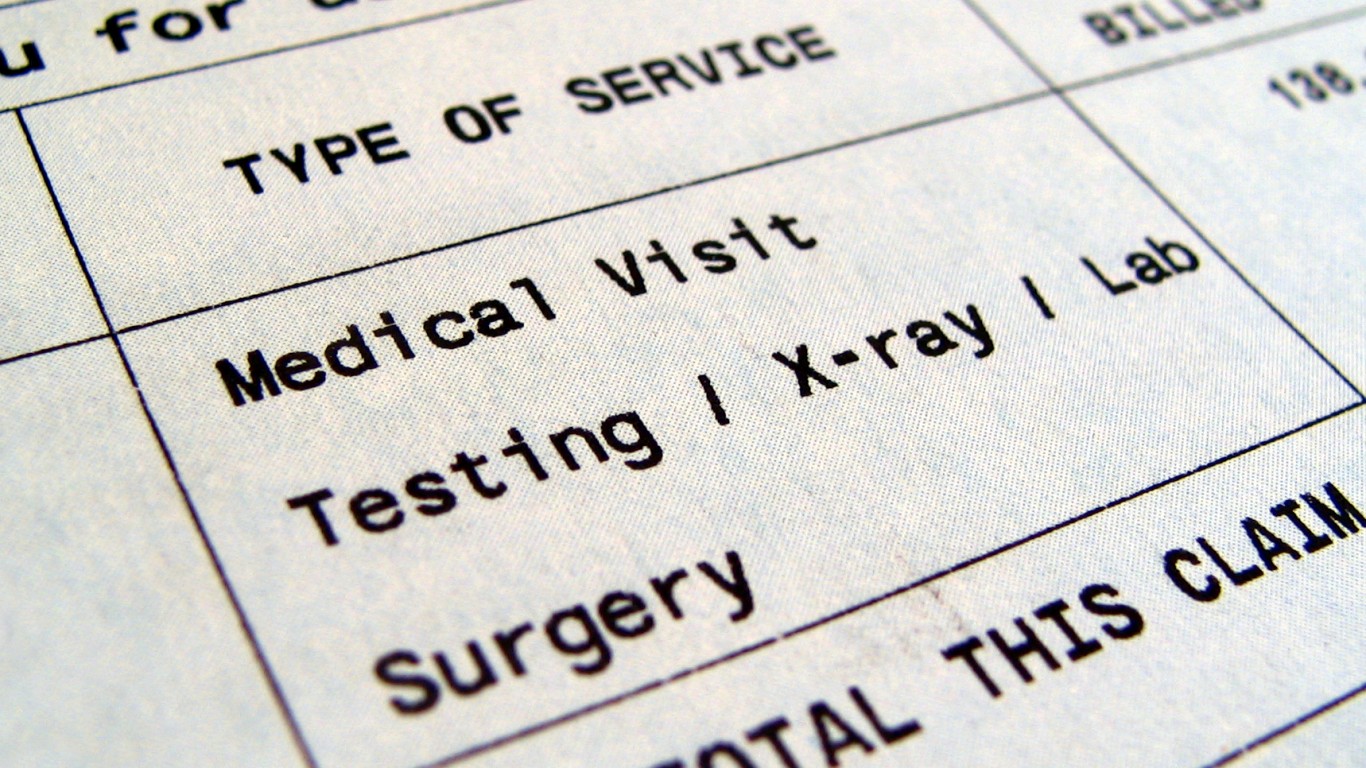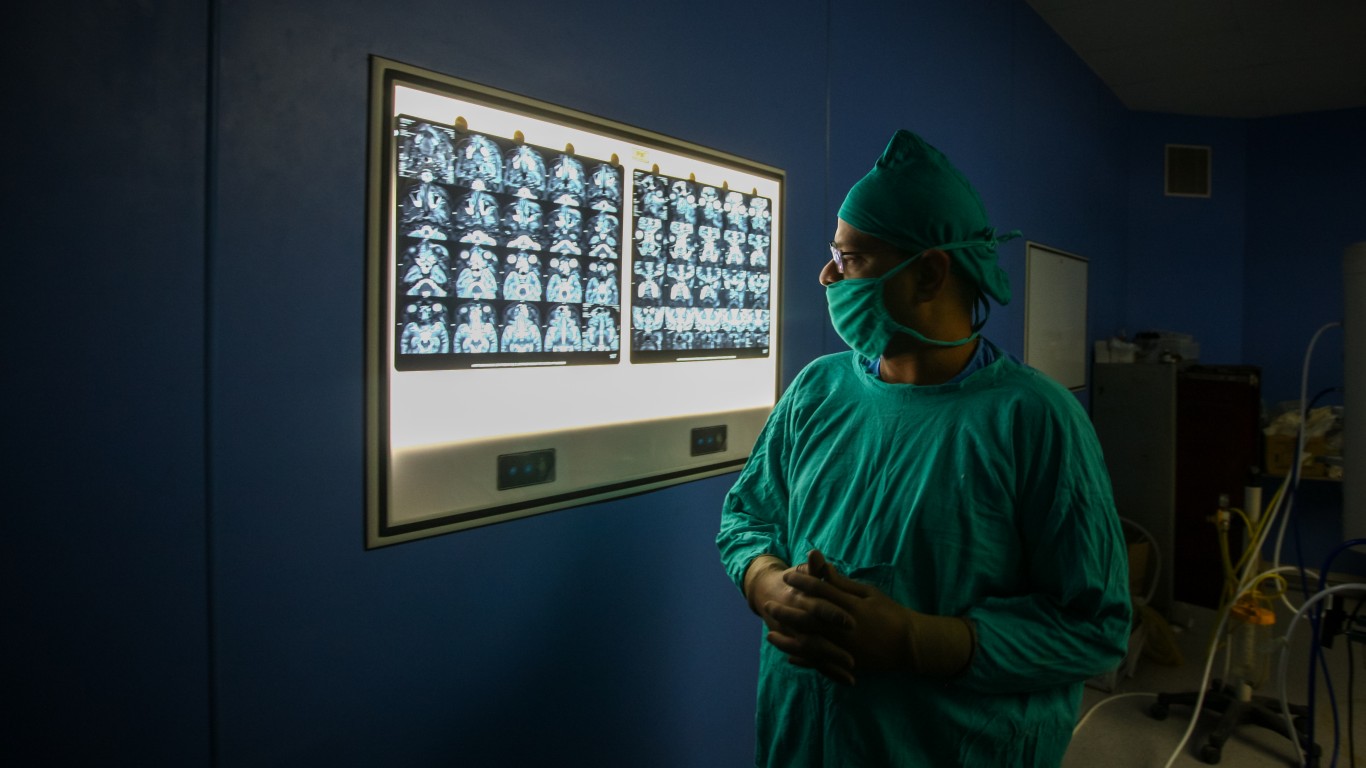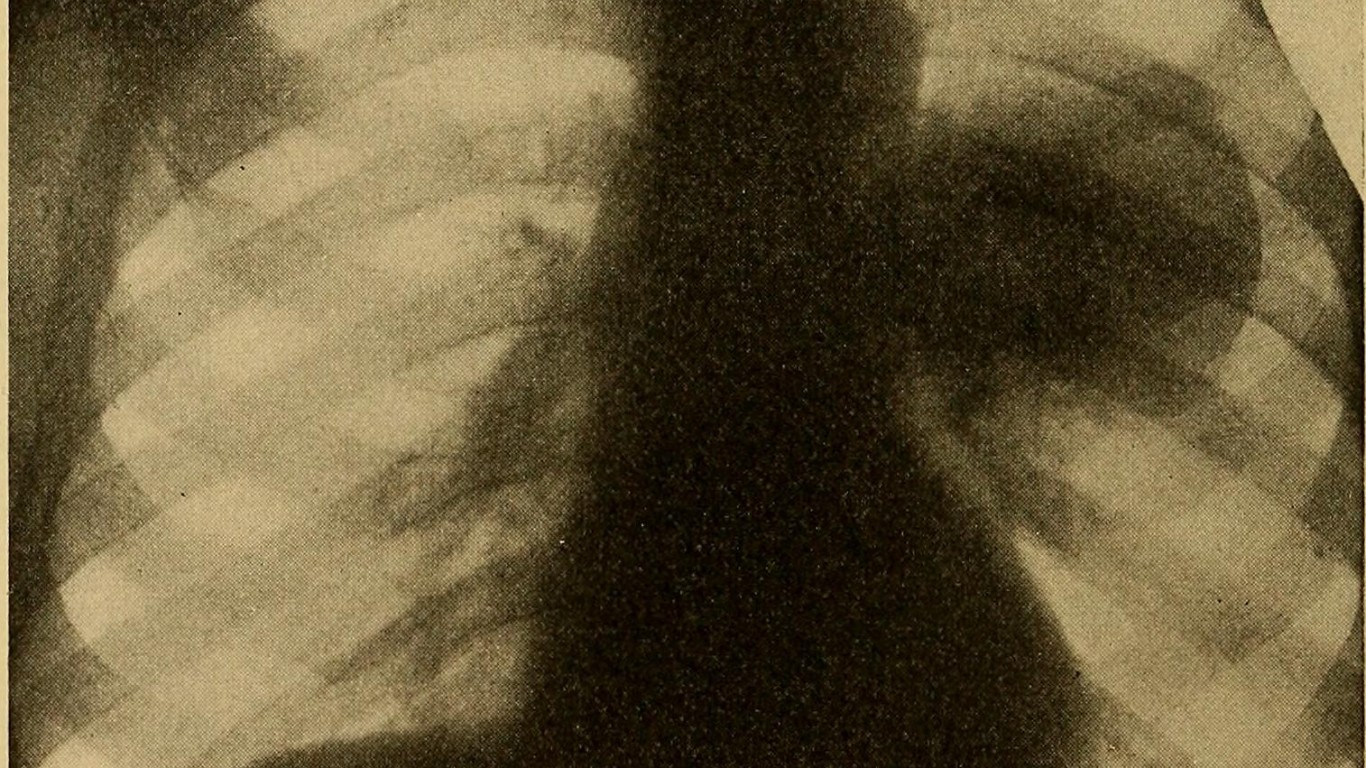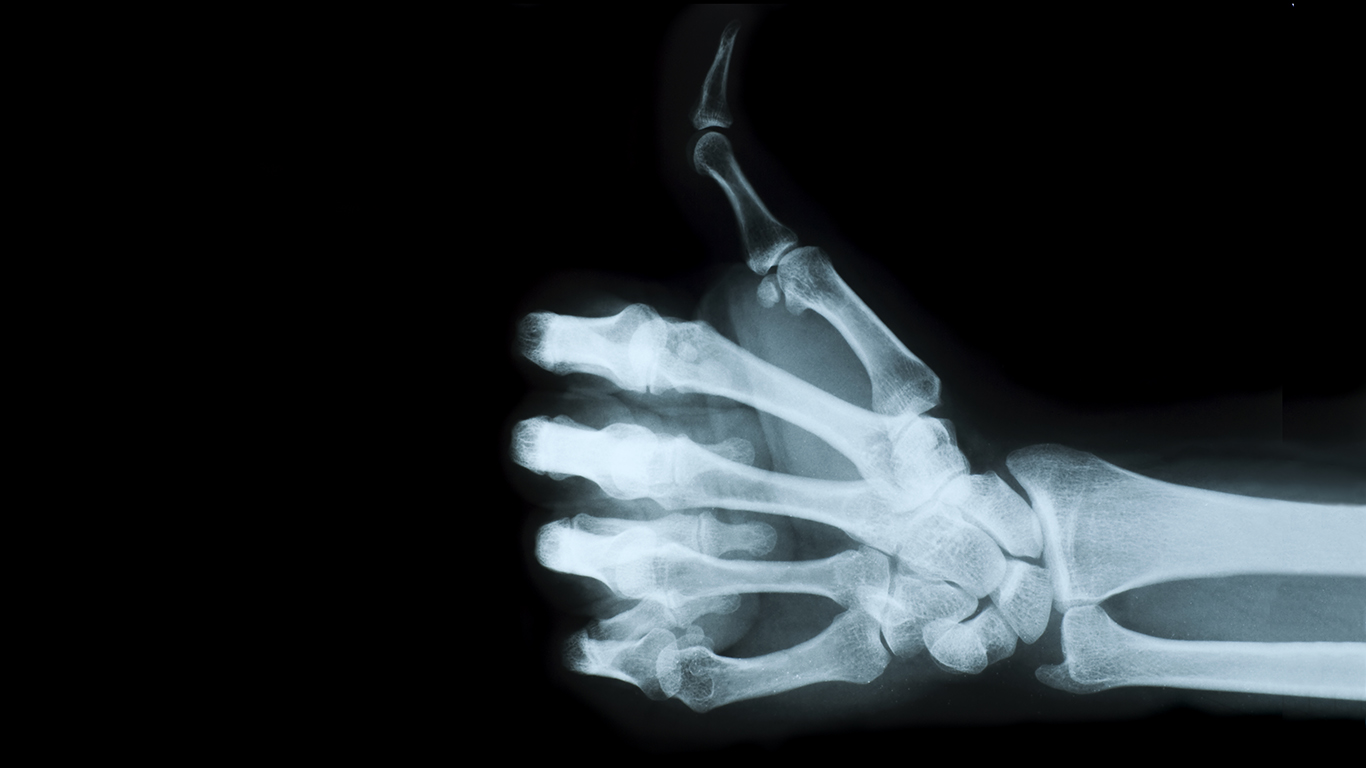
From the high price of prescription medications to necessary surgeries and life-saving treatments, the United States spends more on healthcare than any other developed country – sometimes more than $400,000 over a lifetime for the average American. Even if insurance foots most of the bill, out-of-pocket expenditures for individuals, including co-pays and amounts not covered by insurance, are common and can mount up quickly. (This is how much your state spends on your health.)
Certain conditions can be much more expensive to treat than others. To identify the most expensive ailments in America, 24/7 Tempo reviewed the cost per case dollars, which measures the amount of money spent per episode of care, for 256 detailed conditions treated in the U.S. in 2019 from the Health Care Satellite Account – a set of statistics measuring U.S. health care spending produced by the Bureau of Economic Analysis.
We used the BEA’s Blended Account database, which combines data from multiple sources, including large claims databases that cover millions of enrollees and billions of claims. To concentrate on specific conditions and diseases, we excluded miscellaneous categories such as “Other care and screening.” (Additional data given also comes from the BEA.)
Although a few of these ailments, including some heart attacks and H.I.V. are known to be preventable, the majority of them are not. The causes of a wide range of cancers – which make up seven of the 20 most expensive ailments – as well as appendicitis and ulcerative colitis are variable and poorly understood, meaning that patients may have little control over their progression and hence their need for expensive treatment.
Some of the most expensive ailments, including sickle cell anemia and cystic fibrosis are hereditary conditions. While living a healthy lifestyle is a key factor in preventing certain medical conditions, it often has little to do with some of the most costly illnesses. (Here are the most common ailments in America.)
Click here to see the most expensive medical treatments in America

20. Cancer of stomach
> Cost per episode of care: $10,091
> Annual expenditure on condition: $908,336,648 – #272 most out of 256 conditions
> Annual weighted number of episodes: #90,012 – #296 most
> Relative growth in cost per case spending: #281 fastest
[in-text-ad]

19. Late effects of cerebrovascular disease
> Cost per episode of care: $10,965
> Annual expenditure on condition: $7,721,319,275 – #144 most out of 256 conditions
> Annual weighted number of episodes: #704,201 – #223 most
> Relative growth in cost per case spending: #7 fastest

18. Sickle cell anemia
> Cost per episode of care: $11,138
> Annual expenditure on condition: $766,767,193 – #282 most out of 256 conditions
> Annual weighted number of episodes: #68,840 – #301 most
> Relative growth in cost per case spending: #8 fastest

17. Appendicitis and other appendiceal conditions
> Cost per episode of care: $11,829
> Annual expenditure on condition: $5,369,058,366 – #174 most out of 256 conditions
> Annual weighted number of episodes: #453,890 – #246 most
> Relative growth in cost per case spending: #175 fastest
[in-text-ad-2]

16. Acute myocardial infarction
> Cost per episode of care: $12,003
> Annual expenditure on condition: $15,334,183,326 – #86 most out of 256 conditions
> Annual weighted number of episodes: #1,277,534 – #197 most
> Relative growth in cost per case spending: #276 fastest

15. Cancer of esophagus
> Cost per episode of care: $12,012
> Annual expenditure on condition: $806,621,408 – #278 most out of 256 conditions
> Annual weighted number of episodes: #67,150 – #302 most
> Relative growth in cost per case spending: #254 fastest
[in-text-ad]
14. Cancer of pancreas
> Cost per episode of care: $13,643
> Annual expenditure on condition: $1,667,138,786 – #241 most out of 256 conditions
> Annual weighted number of episodes: #122,197 – #291 most
> Relative growth in cost per case spending: #306 fastest

13. Cancer of bronchus; lung
> Cost per episode of care: $14,244
> Annual expenditure on condition: $9,377,589,208 – #122 most out of 256 conditions
> Annual weighted number of episodes: #658,355 – #229 most
> Relative growth in cost per case spending: #247 fastest

12. Secondary malignancies
> Cost per episode of care: $14,374
> Annual expenditure on condition: $12,691,026,925 – #103 most out of 256 conditions
> Annual weighted number of episodes: #882,896 – #209 most
> Relative growth in cost per case spending: #42 fastest
[in-text-ad-2]

11. Regional enteritis and ulcerative colitis
> Cost per episode of care: $14,968
> Annual expenditure on condition: $18,581,106,689 – #65 most out of 256 conditions
> Annual weighted number of episodes: #1,241,419 – #198 most
> Relative growth in cost per case spending: #5 fastest

10. Cancer of brain and nervous system
> Cost per episode of care: $15,030
> Annual expenditure on condition: $2,110,005,767 – #232 most out of 256 conditions
> Annual weighted number of episodes: #140,389 – #287 most
> Relative growth in cost per case spending: #15 fastest
[in-text-ad]

9. Leukemias
> Cost per episode of care: $15,806
> Annual expenditure on condition: $7,176,378,841 – #150 most out of 256 conditions
> Annual weighted number of episodes: #454,026 – #245 most
> Relative growth in cost per case spending: #19 fastest

8. Short gestation; low birth weight; and fetal growth retardation
> Cost per episode of care: $16,054
> Annual expenditure on condition: $2,586,064,784 – #221 most out of 256 conditions
> Annual weighted number of episodes: #161,090 – #282 most
> Relative growth in cost per case spending: #299 fastest

7. Septicemia (except in labor)
> Cost per episode of care: $18,432
> Annual expenditure on condition: $38,963,634,290 – #30 most out of 256 conditions
> Annual weighted number of episodes: #2,113,895 – #167 most
> Relative growth in cost per case spending: #25 fastest
[in-text-ad-2]

6. Fracture of neck of femur (hip)
> Cost per episode of care: $22,951
> Annual expenditure on condition: $12,623,990,320 – #104 most out of 256 conditions
> Annual weighted number of episodes: #550,044 – #237 most
> Relative growth in cost per case spending: #104 fastest

5. Respiratory distress syndrome
> Cost per episode of care: $32,101
> Annual expenditure on condition: $792,121,947 – #279 most out of 256 conditions
> Annual weighted number of episodes: #24,676 – #310 most
> Relative growth in cost per case spending: #4 fastest
[in-text-ad]

4. Multiple sclerosis
> Cost per episode of care: $33,471
> Annual expenditure on condition: $21,147,451,561 – #59 most out of 256 conditions
> Annual weighted number of episodes: #631,818 – #230 most
> Relative growth in cost per case spending: #3 fastest

3. HIV infection
> Cost per episode of care: $37,356
> Annual expenditure on condition: $21,592,933,156 – #57 most out of 256 conditions
> Annual weighted number of episodes: #578,024 – #234 most
> Relative growth in cost per case spending: #23 fastest

2. Multiple myeloma
> Cost per episode of care: $60,036
> Annual expenditure on condition: $11,316,202,203 – #110 most out of 256 conditions
> Annual weighted number of episodes: #188,490 – #275 most
> Relative growth in cost per case spending: #2 fastest
[in-text-ad-2]

1. Cystic fibrosis
> Cost per episode of care: $136,319
> Annual expenditure on condition: $4,942,155,835 – #185 most out of 256 conditions
> Annual weighted number of episodes: #36,254 – #309 most
> Relative growth in cost per case spending: #1 fastest
Are You Ahead, or Behind on Retirement?
If you’re one of the over 4 Million Americans set to retire this year, you may want to pay attention. Many people have worked their whole lives preparing to retire without ever knowing the answer to the most important question: am I ahead, or behind on my goals?
Don’t make the same mistake. It’s an easy question to answer. A quick conversation with a financial advisor can help you unpack your savings, spending, and goals for your money. With Zoe Financial’s free matching tool, you can connect with trusted financial advisors in minutes.
Why wait? Click here to get started today!
Thank you for reading! Have some feedback for us?
Contact the 24/7 Wall St. editorial team.
 24/7 Wall St.
24/7 Wall St.
 24/7 Wall St.
24/7 Wall St.


